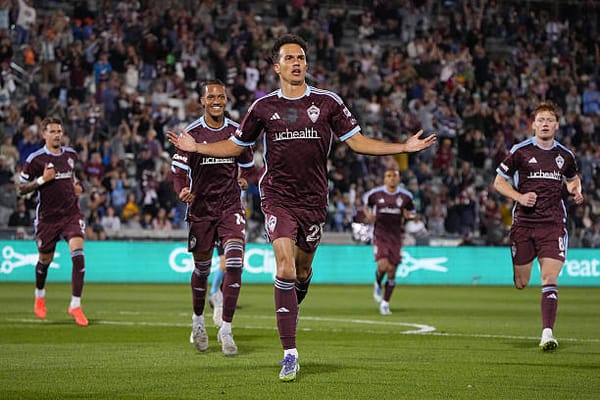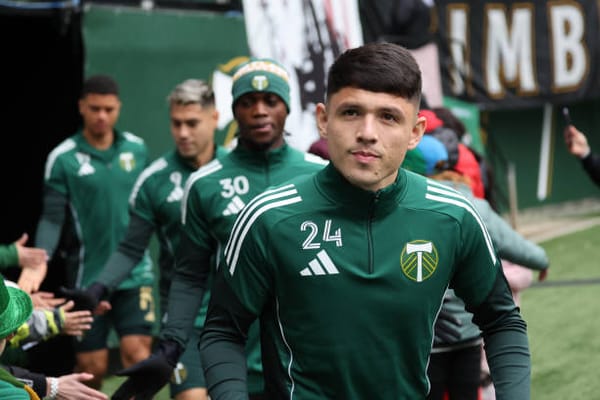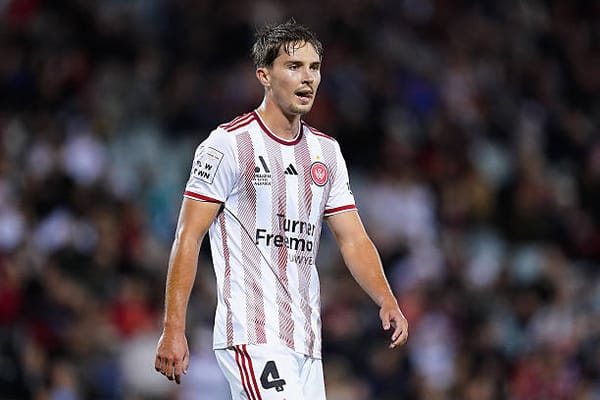Lessons To Be Learned: The Leagues Cup Edition
A very disappointing loss in St. Louis results in a recalibrating of expectations.
After a 3-1 defeat to St. Louis City in the Round of 32, the Portland Timbers have been eliminated from Leagues Cup.
In the second minute, Simon Becher had a free header off of a corner kick that was saved by Maxime Crepeau. Just like in the Colorado game, the Timbers were lucky not to be down 1-0 within the opening stages. The hosts didn’t have the lion’s share of possession in the first half, but outshot the Timbers 9-3. The biggest event of the first half happened in the 12th minute, when Evander exited the pitch due to injury. Portland’s defense largely held up aside from a couple of chances, but the attack was nowhere close to contributing.
Cascadia FC's Substack is a reader-supported publication. To receive new posts and support my work, consider becoming a free or paid subscriber.
The second half began with a wake-up call. A poor goalkick from Crepeau was immediately seized by the visitors, and a weird deflection fell to Cedric Teuchert who slotted it past the Canadian keeper for a 1-0 lead in the 52nd minute. But the Timbers never know when they’re beat. They got their first corner kick in the 54th minute, and the clearance of Eryk Williamson’s cross fell right to Claudio Bravo. The Argentinian's first time shot was an absolute beauty; going to the far post and leaving goalkeeper Roman Burki rooted to the spot. An almost instant response. The Timbers kept pushing forward, but couldn’t create any good chances. So the hosts took the lead in the 83rd minute when a short corner routine paid off and Marcel Hartel had an easy finish past Crepeau. Portland could have kept pushing for the equalizer, but St. Louis found their third goal five minutes later. Another poor clearance was picked up by Eduard Lowen, who dribbled unmolested to the edge of the box when David Ayala made a challenge. The ball spurted up in the air and Becher was able to volley home the weird bounce to seal the game for the hosts. For the second year in a row, Portland’s Leagues Cup run ends in the Round of 32.
Normally for these recaps, I take a few big-picture thoughts and then give an account of each player that had significant minutes. The result and performance from tonight has inspired me to change that approach. This recap is only going to focus on the big picture. Specifically, there are several lessons to be learned. Now that their Leagues Cup journey has ended, it’s time to turn our collective eyes back on the MLS season.
Road Games
Much of Portland’s glittering stretch of form from the end of May until the Leagues Cup break has taken place at Providence Park. I spoke about that in my preview of this match.
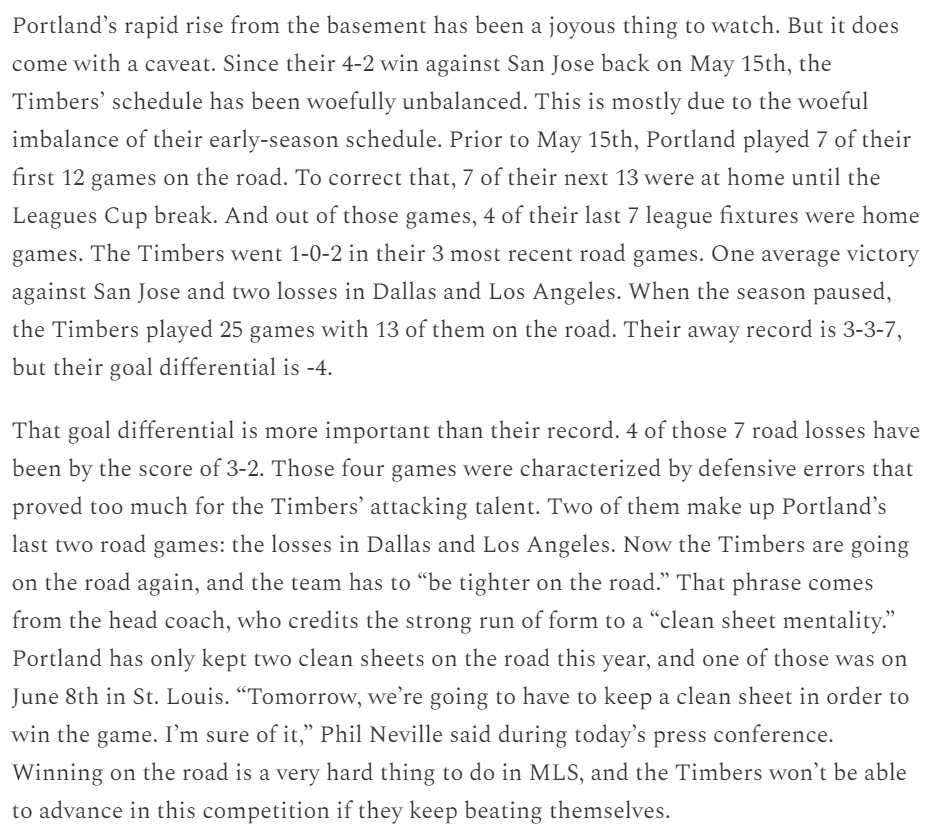
This “clean sheet mentality” was nowhere to be found during tonight’s performance. Portland has only kept one clean sheet on the road this season, and it was in Austin against a severely depleted team. More sloppy mistakes, more poor hustle, and no intensity to be found. What St. Louis lacks in technical quality they make up for in a strong identity and excellent teamwork. St. Louis wanted to win, and they wanted to win more than the Timbers, so they won. This wasn’t a normal league game. This was a knockout game in a tournament. Portland had 8 days of rest while the hosts only had 6. If this was a league game, this performance would be completely unacceptable. But it wasn’t just a league game. It was a tournament game where they had to win in order to advance. Sure, they got better in the second half, but they weren’t able to capitalize on the biggest moments. Right before St. Louis opened the scoring, Jonathan Rodriguez sent a point-blank shot over the bar. It could have been 1-0 right there, but it wasn’t. For the third time in a row, the Portland Timbers conceded three goals on the road and lost. They haven’t lost at home since the 2-1 loss to Seattle on May 12th. That was the wake-up call for the whole team, and they were trailing 2-0 at halftime to San Jose in their next game only three days later. They won’t play on the road for another month. A trip to Colorado on September 14th is the next away day on the calendar. Three more road games are on the schedule to close out the year: RSL on September 21st, Vancouver on September 28th, and a Decision Day trip to Seattle on October 19th. Those are not easy trips. None of their matches are easy for the rest of the season. Their ultimate goal for the rest of the regular season has to be getting a top-4 seed in the West. And it’s not going to be easy.
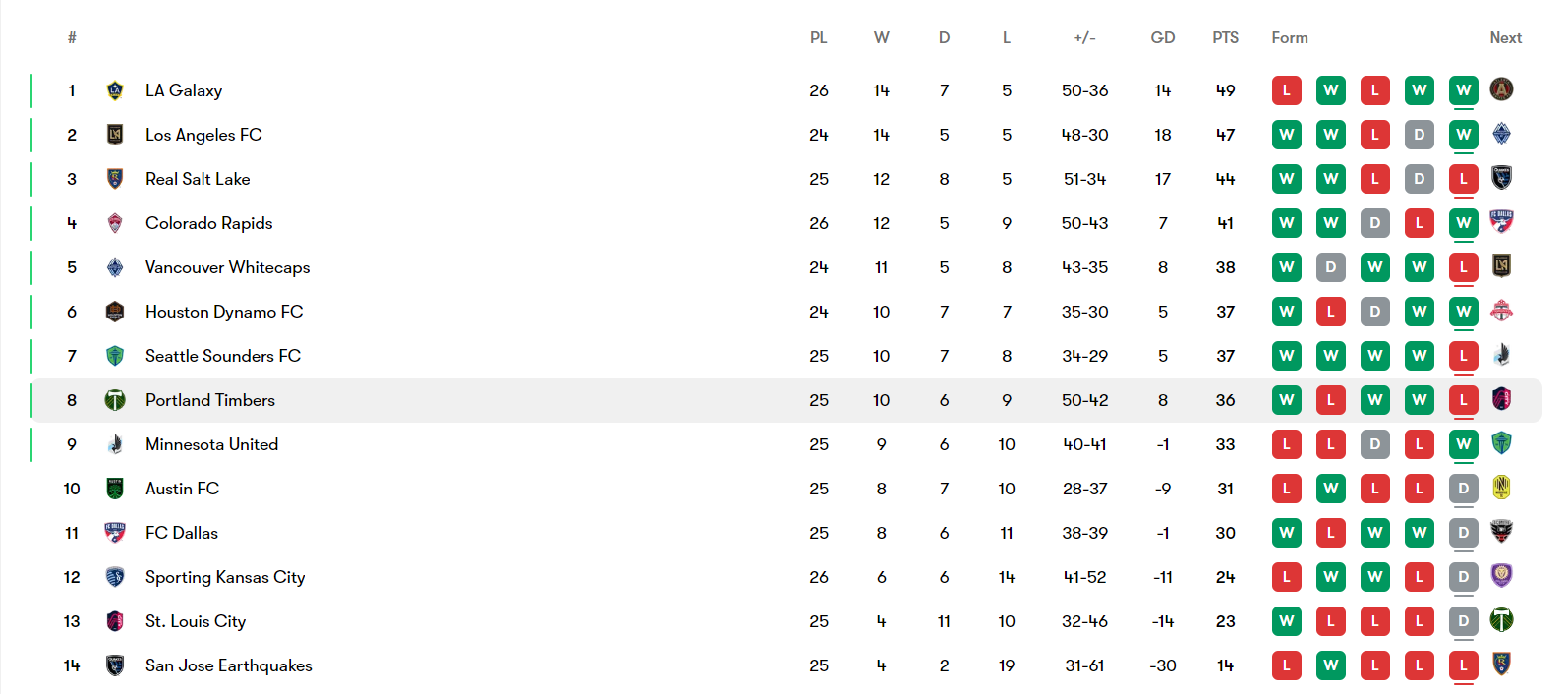
Not only do several teams ahead of them have games in hand, the Timbers are already five points behind 4th place. Four of their final 9 games are against teams ahead of them in the table, and they’re all road games. Portland’s road form has been the biggest problem this season. They only had two home games during the 9-game winless streak at the start of the year. This team is a completely different team when they go on the road. They don’t press, they don’t defend as a team, and they’re sluggish in the attack. Despite that aforementioned 2-0 victory in Austin being their best road result on paper, I think that their best road performance was the 2-2 draw in Columbus. The Crew are a much better team than Portland, but the Timbers made it very hard for them to get a result on their home field. They brought the intensity and organization in that game, while it completely flew out the window tonight. But that’s not all. Those teams ahead of them (aside from the Seattle Sounders) have made key additions during the past month while the transfer window has been open. RSL has a new DP #10, Houston has a new DP #9, the Galaxy are signing Marco Reus, and Olivier Giroud now plays for LAFC (and Antoine Griezmann might follow).
The Future Is Now
Here is the second lesson that the Timbers need to learn tonight: they cannot sit on their hands and count their legs before the transfer window closes in five days’ time. There is an open DP slot and an open U22 slot. One of those has to be filled before the window closes. And it has to be a central midfielder. Tonight’s game is significant for me as a Timbers fan: I realized that Diego Chara is not an everyday starter anymore. Throughout this season, he has been rested for a couple games to preserve his legs. Tonight, he looked slow. He is still a valuable member of this roster, but the Timbers cannot expect to challenge for a top-4 spot with Chara putting in full 90s every week. His heir is already here, and he’s thriving.
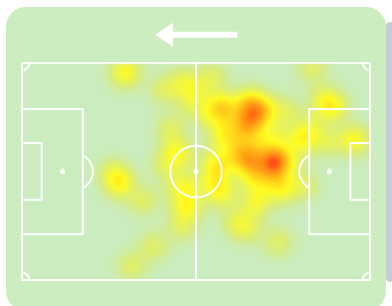
Sixteen months ago, David Ayala tore his ACL on the same exact surface that the Timbers played on tonight. He entered the game in the 12th minute as a substitute for Evander and was the best player on the pitch wearing a Timbers jersey. Ayala is definitely a midfielder (duh), but it wasn’t always clear what role he should play in the double pivot. He is a number 6. But he’s not just any 6: he’s a Diego Chara 6. The Argentine has learned from his teammate and now plays at the level that a younger Diego Chara would bring every single game. He is undoubtedly the best midfielder on this team right now, and that shouldn’t be controversial. What the Timbers have to do in the next five days is get a deal for his long-term partner over the line. They have the roster flexibility. There is plenty of money left over from the Rodriguez deal. This roster is great at home, but it can’t win on the road. Good MLS teams fix problems after they arise. Great MLS teams build for the future while also fixing current problems. The Timbers of the past would often wait for those problems to arise before fixing them. Adding a new central midfielder who can start immediately alongside Ayala would seriously help this team climb the table and be prepared for the future. Other teams around them have been getting better; adding new starters who can instantly make an impact. Portland’s two signings this summer are a 20-year old center back who will (likely) be a depth piece this year and a backup striker. There is room for another starter on this team, and the Timbers have to act now before the window shuts.
The First-Choice Center Back Pairing
It is the beginning of August and the Timbers have four (maybe five?) starting quality center backs. The coaching staff has been unable to figure out what the first-choice pairing is. This is too big of an issue to address in this article alone, and now there are two weeks until the next game. Keep your eyes open for a deeper dive into this issue, because it is crucial to the rest of the season.
DP Regression
Jonathan Rodriguez only has one goal in his last five games. Teams are figuring out how to erase him from games, and the Timbers are only making it easier. He is often isolated on the left wing with very little support. This makes it very easy for the opposition to double-team him. Rodriguez is the type of player that needs a lot of service so he can have more chances. If he is only limited to a couple of chances per game, he’s not going to score a lot of goals. He led the team with four shots, but he couldn’t score his best chance of the night. That is the type of chance that he is paid to finish. But I’m not worried about that as much as I am worried about his lack of support on the left wing. He’s not the type of player that is going to consistently beat defenders on the dribble. He is a target for the final ball, not someone who should be playing the final ball. The coaching staff needs to figure out how they can provide some support for him without weakening a part of their defensive structure. Juan Mosquera constantly overlaps and underlaps on the right side, so the Timbers often use that side to attack. But if teams are forcing the Timbers to go left, Rodriguez is out on his island. This needs to be fixed before the season resumes in two weeks.
Felipe Mora also falls into this category, but his is also a consequence of the system and not the player himself. Earlier in the year, Mora’s conversion rate was extraordinary. It proved one thing that everyone knew about him: just make sure he can find the final ball. I don’t think he was awful tonight. I actually found it rather harsh when he exited the pitch in the 59th minute. Although he is small in stature, the Chilean is elite in hold-up play. The players around him just couldn’t get him the ball. Mora also has only one goal in his last five games, and didn’t really get going in Leagues Cup. Portland ended the tournament with zero goals from their DPs (Mora had 1 assist and Evander had 3). This was a game that was crying out for Portland’s DPs to make a mark. St. Louis’ DPs combined for 1 goal and 2 assists tonight (the other one had 4 saves). Evander left tonight’s game early with an injury. Phil Neville called it a “tight calf” in the post-game press conference and said his substitution was mostly precautionary. Time for a fun little Evander stat: the Timbers haven’t won a road game this season when Evander hasn’t played the full 90. At home, it’s a different story. Portland has scored 4 goals in a game twice when Evander was absent from the team. His stellar campaign has been able to bandage several of this team’s bigger weaknesses. And after a result like tonight’s, in a survive-and-advance situation, the Timbers fell flat when their star man had to exit. It’s not the biggest reason why they lost, but it is a major factor.
Some Shoutouts
I would like to praise Claudio Bravo and Santiago Moreno’s contributions tonight. Even though Bravo wasn’t at his best defensively during the biggest moments, he wasn’t the sole reason why the Raviolis triumphed. It’s a shame that his wonderful goal has this result attached to it. He finally got the first-time banger that he’s been craving since he arrived in Portland. Moreno was the driving force in the attack for the majority of the game, and looked pretty comfortable at the 10 when Eryk Williamson was subbed out. I think he has surpassed Williamson in that role (at least on the road) for the time being. Both of those players and Ayala showed up to play today. So did Maxime Crepeau, who saved some shots and let in some others. But the team’s mentality was left on the tarmac at PDX. The Timbers were beaten by an inferior opponent who had a superior performance.
The Final Lap
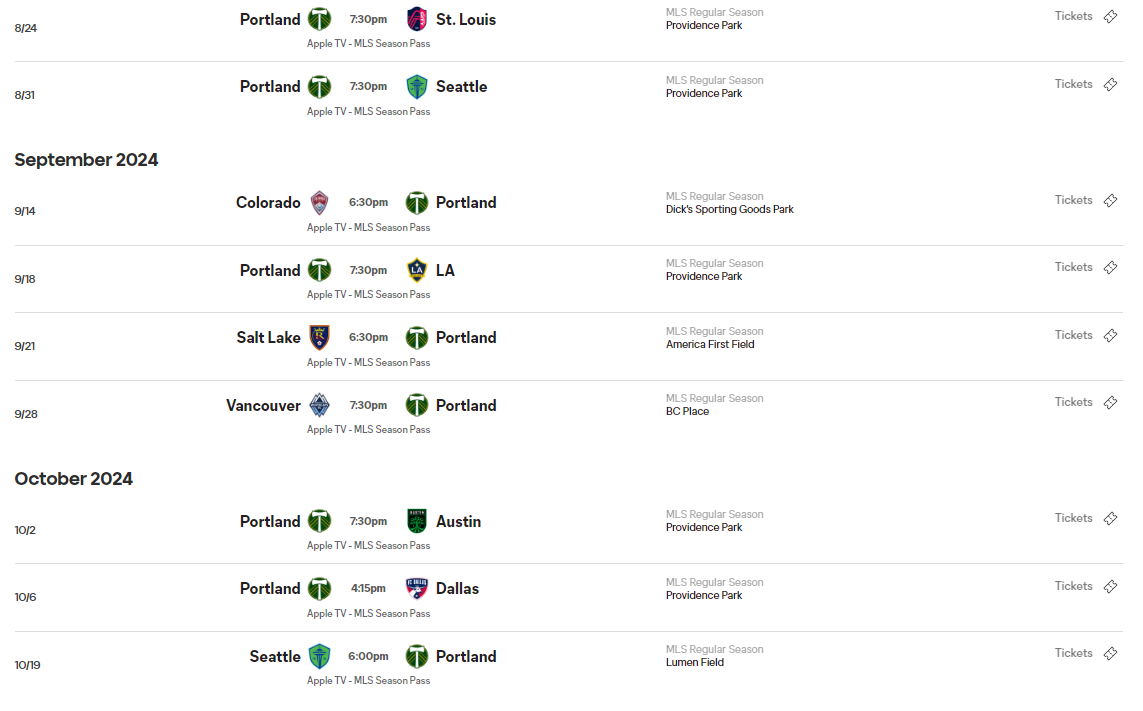
Now that the Timbers have been eliminated from Leagues Cup, they have 2 weeks until their next game: a home match against St. Louis. They have an opportunity to get revenge almost instantly. The Summer Olympics have been quite an enjoyable watch over the past couple weeks, so I’m going to rebrand this 9-game stretch to close out the year as The Final Lap. Portland’s strong middle section of the MLS race has brought them back to the middle of the pack after a disastrous start. Their next two games are at home. Then they travel to Colorado after an international break. Every single game is a must-win. But the Portland Timbers won’t be truly tested until that mid-September trip to the Rockies. Previous editions of the Timbers have been able to win the games that matter most on the road. Their 2015 run was buoyed by strong performances in the away legs of their playoff matchups. Same with 2018. This team used to always be up for the big games. Tonight was definitely a big game despite the weird attitude that some people have about this tournament. They have an opportunity to put this disappointment behind them and throw all of the excuses out the window. This Timbers team is good. There’s no denying that. But they won’t be great until they learn how to win important games on the road. All of their road games during The Final Lap are important. They are on the precipice of something special, but haven’t put it together yet. The quest is over, but the climb continues.
Cascadia FC's Substack is a reader-supported publication. To receive new posts and support my work, consider becoming a free or paid subscriber.


